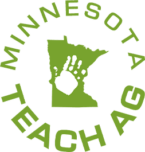Agricultural education is a rewarding career path that combines a passion for agriculture, food and natural resources with the ability to teach and inspire the next generation. Whether you envision yourself in a classroom, working in public outreach, or educating others through agribusiness, there are many ways to prepare for a successful career in this field. Here are four simple yet effective steps to get started.
1. Shadow an Agricultural Education Professional
The opportunities with an agricultural education degree are limitless! By spending time shadowing professionals in the field, you can gain firsthand experience and insight into various career paths. Consider shadowing an agriculture teacher, a youth outreach coordinator, a communications and education manager at an agricultural company, or an agricultural sales representative. These experiences allow you to interact with professionals, expand your network, and better understand what a career in agricultural education entails.
To find a professional to shadow, try the following:
- Talk to your agriculture teacher.
- Explore Minnesota’s list of agriculture teachers.
- Reach out to a local 4-H youth outreach coordinator.
- Connect with your academic advisor for opportunities.

2. Gain Hands-On Experience
Practical experience is key to developing strong teaching and leadership skills. Look for mentoring opportunities at your school or within your community to build experience in educating others. If you're a member of FFA, consider taking on a leadership role, such as becoming a student advisor or coaching a Career Development Event (CDE) team. These experiences help develop essential skills in communication, leadership, and youth development, all of which are vital for a future in agricultural education.
3. Secure an Internship
Internships are a great way to build your resume while gaining industry knowledge, leadership experience, and professional connections. Many agribusinesses, education programs, and organizations offer internships that provide real-world exposure to agricultural education. Not only will you enhance your skills, but you'll also gain valuable insights that can be applied to your future classroom or career.
4. Research and Stay Informed
Staying informed about agricultural education trends, best practices, and professional development opportunities is crucial. There are numerous resources available, including books, podcasts, and events tailored for aspiring agriculture teachers. Here are some great places to start your research:

- Minnesota Teach Ag – A hub for agricultural education resources and information.
- Minnesota Agricultural Education Leadership Council (MAELC) – Offers support and guidance for future agriculture teachers.
- Minnesota Teacher Preparation Programs:
- Southwest Minnesota State University (SMSU): Connect with Dr. Kristin Kovar or visit SMSU’s Agricultural Education website.
- University of Minnesota Crookston (UMC): Connect with Dr. Mike Martin or visit UMC’s Agricultural Education website.
- University of Minnesota (UMN): Connect with Dr. Amy Smith or visit UMN’s Agricultural Education website.
Start Your Agricultural Education Journey Today!
A career in agricultural education is both impactful and fulfilling. By shadowing professionals, gaining hands-on experience, securing internships, and staying informed, you can set yourself up for success in this exciting field. Whether you want to teach in a classroom, lead outreach programs, or work in agricultural communications, now is the perfect time to start preparing for your future in agricultural education!
